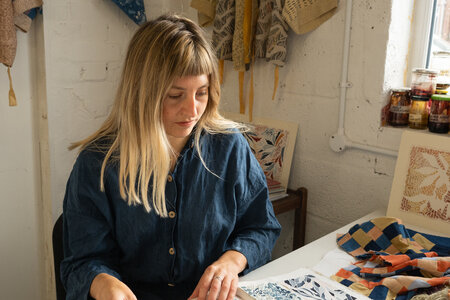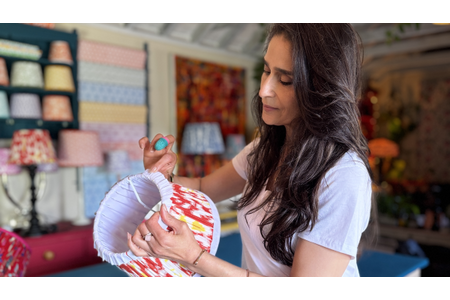'A human needs to be able to make' - a conversation with woodturner Richard Findley
Ahead of his woodturning courses in our new autumn/winter programme we sat down with tutor Richard Findley to discuss the value of making, the addiction nature of woodturning and why in-person tuition still trumps all.
Can you just start by introducing yourself and the course that you'll be teaching at West Dean?
I'm Richard Finley, I'm a professional woodturner based in Leicester and I’m running bowl-turning courses at West Dean. The course is aimed at turners with some experience who want to turn better bowls! There's a lot of turners out there who buy the gear and want to get stuck in and make a few things, but they lack a little bit of finesse and the main aim is to try and upskill people a little bit, refine their technique, remove a few bad habits that they might have got into. There’s actually been quite a range of skill sets on the previous courses I’ve run, from real beginners to those who have been doing it for a while and just want to brush up on the skills.
You have amassed quite a following on social media giving tips and tricks on turning, what is the benefit of one to one tuition as opposed to watching your videos on Instagram or other tutorials on YouTube?
The main thing is that some of the subtleties can be lost by watching through a screen. I can describe it in 100 different ways on a video but actually when someone sees it and they’re holding a tool and making a change in the presentation of the tool it suddenly it goes from a terrible noise and a horrible finish to it cutting in perfect. That's quite satisfying both for me and for the student. There are some subtleties that don't quite come across on a video, even really good videos that are 4K quality, for me to see how someone's turning and then be able to say ‘actually if you just do this or change the way you stand or the way you hold the tool’ you can massively improve their technique and their finished product.
You’ve done a number of courses here at West Dean, could you say something about the West Dean experience?
I mean the main thing about teaching at West Dean is the setting really. You drive down that long driveway, you've got the rolling hills and fields, and then you come up to the front of the main house. It's a beautiful place to be doing anything, but then when you get into the actual workshop, it's well appointed, it's got everything the students need and has good quality lathes. The whole experience of teaching and learning at West Dean is special, it's probably one of the place best places out there to go.
How did you get into woodturning and what do you love about it?
I trained as a joiner originally and I used to work for my dad and the family business. On our long lunch breaks I was always looking for something to do so, once I finished my sandwiches, I used to make bits of furniture and carve wood. I thought if I could buy a lathe and turn some legs or knobs and perhaps combine it with the furniture and carving to create some sort of masterpiece. As it happens, turning is quite addictive, as nearly everyone who tries it finds. Before long I was doing more turning than anything else. Eventually, once I found that my house was full of wooden things and everyone I knew was writing with a wooden pen I thought I better do something with this stuff that I'm making. I started selling bits from dad's showroom, then built a website and I picked up some regular customers and it just started to grow from there really until woodturning was my full-time work.
I enjoy making with my hands a lot, using tools, using machinery, making a finished product. I don't really mind what that is, so for me most of my work is commission based, so it's making things that that customers need. As a result, I've had to develop quite a broad skill set in woodturning, so I can meet all of these weird and wonderful challenges that people bring me.
Why should people come on a course and engage in the creative act?
Well, I think 50 or so years ago people would go to work and they would make things, build things or they would dig things. There was a lot more manual work and these days there's a lot of work sitting at a desk looking at a computer screen and it pays the bills but it's not fulfilling. I think it’s in our human nature to do things with our hands. We need to make and build and that might be through painting, pottery or any other crafts offered at West Dean. But to be able to finish a piece of work created by your hands in a way that people have done for millennia is incredibly satisfying. People find it relaxing to be able to switch off from their day-to-day, you are forced to concentrate as it's potentially dangerous. There's spinning bits of wood and sharp tools and you have to have a level of focus which means you can't think about the argument you had earlier or the meeting you've got tomorrow. It shuts that off, it's meditative in some respects and it quietens the noise of everyday life. A human needs to be able to make and build and mend things.


